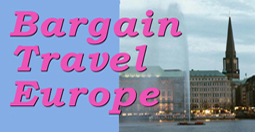TRAVELING SAFE
Travel Safety Tips In Europe and Abroad
Part One - Money - Packing - Documents - Phone
Being safe and secure while traveling takes just a little thought, common sense and planning ahead. Obviously, first try to get know a little something about the country you’ll be visiting. Don’t worry about trying to knowing everything, one of the joys of travel is discovering the stuff you don’t know, but a little familiarity with the customs and workings of a culture will go a long way. Travel to most of western Europe is pretty similar in laws, with a few unique distinctions. Following are some general safety tips that can apply wherever you might go.
What to Bring
Safety begins when you pack. To avoid being a target, dress conservatively. Don't wear expensive looking jewelry, though take a few less precious pieces for going out. A flashy wardrobe or one that is too casual can mark you as a tourist. Besides you’ll want to buy all that stuff on your trip, anyway.
Always try to travel light. Baggage charges and hauling luggage through airports and train stations can be a pain. You can move more quickly and will be more likely to have a free hand with fewer bags. You will also be less tired and less likely to set your luggage down, leaving it unattended. Carry the minimum amount of valuables necessary for your trip and plan a place or places to conceal them. Your passport, cash and credit cards are most secure when locked in a hotel safe. When you have to carry them on your person, you may wish to conceal them in several places rather than putting them all in one wallet or pouch. If you take cash or travelers checks you may want to keep a portion in separate places, some in the room safe and some with you, so if something gets stolen you’ll have a reserve.
Avoid handbags, fanny packs and outside pockets that are easy targets for thieves. Inside pockets and a sturdy shoulder bag with the strap worn across your chest are somewhat safer. One of the safest places to carry valuables is in a pouch or money belt worn under your clothing. Some travelers have a special around the neck travel wallet, though that may attract more attention, and nothing says tourist like a passport around the neck. If you carry a wallet, keep it in a pocket you are not used to, so you feel it. Beware of back pockets, an easy target for pick-pockets. And only take those cards you may need on your trip. You can leave the library card and gym club ID at home.
If you wear glasses, pack an extra pair. Bring them and any medicines you need in your carry-on luggage. To avoid problems when passing through customs, keep medicines in their original, labeled containers. Bring copies of your prescriptions and the generic names for the drugs. If a medication is unusual or contains narcotics, carry a letter from your doctor attesting to your need to take the drug. If you have any doubt about the legality of carrying a certain drug into a country, consult the embassy or consulate of that country first.
Money - Cards - Cheques
Bring no more than two major credit cards with you, rather than large wads of money. Take just enough cash with you to get through the arrival process, exchange for foreign currency before you leave or you can change some on arrival. The easiest and cheapest way to get cash while traveling is with an ATM card, most of which have interbank network capability. In Europe credit cards have chips while many U.S. cards do, so they may not work in some serve yourself device. Travelers cheques have become a thing of the past. Aemrican Express has stopped selling them, though Thomas Cook still does. They can be used as a safety backup to store in a safe place in case your cash or cards get stolen while out and about. If you don’t use them and cash them back in after your trip. When you do use a bank teller machine, keep an eye out for scammers getting near enough to scope your pin number or trying to assist you or ask questions. Don’t use atm machines late at night if you can avoid it. Many European banks in large cities have machines inside secure areas where the card allows access.
Pack an extra set of passport photos along with a photocopy of your passport information page to make replacement easier in the event your passport is lost or stolen. Put your name, address and telephone numbers inside and outside of each piece of luggage. Use covered luggage tags to avoid casual observation of your identity or nationality. If possible, lock your luggage. Get a cable lock if you're taking your computer. If you’re traveling by train and have multiple pieces of luggage, you can take a bike lock cable so you can lock the pieces together if you wander away from them.
Phone Communcation
For phone communication if you don’t have a four band international cell phone, and on a trip over a week or two, you can purchase a local pay-as-you-go mobile phone in many electronic stores and now airports or train stations. Get one which can change data chips for travel in different countries. On shorter trips a phone calling card, can significantly save on international phone rates.
Travel Safety Part 2 - Before You Go and Scams


